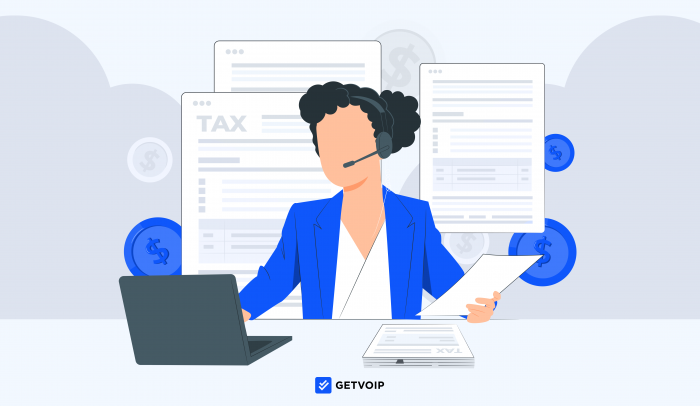VoIP phone systems provide significant cost savings on business communications by offering unlimited local and long-distance calling, desktop and mobile device compatibility, and automations to boost productivity and streamline workflows.
However, if your VoIP costs have been inexplicably increasing over the past few months, it could be a sign your provider is charging excessive and/or illegal fees.
In this post, we’ll outline legal VoIP taxes and fees, highlight charges to be suspicious of, and teach you how to lower your business phone bill.
- Legal VoIP Fees
- VoIP Fees to Watch Out For
- How to Reduce Phone Bill
- Is VoIP Regulated By the FCC?
- Find the Right VoIP Provider
Legal VoIP Fees
Because the VoIP industry is subject to government taxes and regulated by the Federal Communications Commission, there are several fees that they are legally permitted to charge customers.
Legal VoIP fees include:
E911 Fees
Enhanced 911 (E911) fees cover the cost of ensuring that telephone service providers meet the FCC’s VoIP regulations regarding the ability to locate a caller who dials 911.
VoIP providers must:
- Provide 911 service as a mandatory standard feature of every plan, with no ability to opt-out
- Transmit and route a 911 call to the appropriate emergency call center if emergency services cannot process the caller’s location or callback number
- Obtain and provide emergency services with a customer’s physical location and callback number
- Affirm customers understand the limitations of 911 service
E911 fees also fund emergency response systems, and are charged per service line by the local and state government. Specific E911 fees vary by customer state, but range from $0.20 to $2.00 per line. Users may also be charged for using 411 information services.
USF Fees
According to FCC regulations, all VoIP and telecommunications providers are required to pay Federal Universal Service Fund (USF) fees–generally 15.5-33% of a VoIP provider’s revenue.
While VoIP service providers can legally pass-through costs of these USF fees to their customers on a per-line, per-month basis, they may only charge customers the minimum amount required to fund their USF fees.
Note that these fees may fluctuate, as the required contribution factor changes four times each year.
Number Portability Fees
While not required by the FCC, service providers are allowed to charge users for number porting–often referred to as Local Number Portability (LNP) charges.
In most cases, LNP fees are a one-time charge covering the costs of porting (transferring) local, fax, and toll-free phone numbers from one phone company to another.
They are charged on a per-line basis and are set by your provider–meaning end users can negotiate lower or no number porting fees.
Companies are not legally allowed to refuse to port a number because the customer has not paid for number porting. These providers are allowed to charge for only what it costs them to port a number, but these fees may vary based on location and carrier.
Fees generally fall within the range of $10-$20 per ported telephone number.
Federal, State, and Local Tax
Virtual telephony companies are legally required to charge and remit customer taxes on the federal, state, and local levels.
The exact cost of telecommunications taxes will vary based on location as well as the specific type of service provided. However, in some cases, the provider has control over how much it charges for communications tax and use tax rates.
VoIP taxation may include:
- Local sales tax
- Taxation at the state level
- Federal excise tax
- City tax
- Additional state taxes from local governments
- License tax
- Franchise tax
- Intrastate toll tax
- Transit tax
- Public utility tax
Gross Revenue Surcharge
The gross revenue surcharge offsets the costs of your VoIP provider’s federal and state taxes (gross receipts tax).
A customer’s gross revenue surcharge is the percentage of the taxes charged on the revenue they brought the provider. While tax laws payments are government-mandated, gross revenue surcharges to customers are not–but they’re not illegal.
Intercarrier Compensation
Intercarrier compensation is a fee one carrier pays to another to make, send, and end telecommunications over their network. Intercarrier compensation fees vary based on call type, the call’s origin and termination location(s), and if the carrier telephone network is wireless, local, or long-distance.
These fees include:
- Access Charges: Fees long-distance carriers pay local service providers to make/terminate VoIP calls on a local network (more expensive)
- Reciprocal Charges: Charges relating to calls made in the same local area
Interstate access charges are mandated by federal laws, while intrastate charges are managed on a local level.
Internet Infrastructure Surcharge
While not mandated by the federal or state governments, some providers may legally charge customers to cover the costs of the local Internet infrastructure and network.
VoIP Fees to Watch Out For
While the below fees and charges are legal, some providers grossly inflate them to increase profit margins and pass the expenses of following regulations onto consumers.
If you see any of these fees as a line item on your billing statement–especially if they’re hidden or excessively high–speak to your provider immediately.
Early Termination Fees
Early Termination Fees (ETF) are easily the most popular way to price gouge VoIP customers.
ETFs are charged to customers who terminate their VoIP service contract before its official end date–even if the reason for doing so was the provider’s fault.
Failure to read or understand early termination fee terms before signing a years-long contract could mean paying for multiple.
If you’ve already signed a contract with your VoIP provider, try to cancel your service at least 30 days before the next annual or monthly billing cycle begins–and always avoid an automated billing option.
The new provider you’re switching to may be able to negotiate the old provider’s termination fees on your behalf.
Feature Add-on Fees
Low-quality SaaS providers will offer what appears to be a great deal on a monthly plan–only to tell you essential features are available only as paid “add-ons.”
While add-ons like higher video conference participant caps, additional cloud storage space, toll-free minutes, or SMS texts are normal, other
This means you could end up paying more to improve the cheapest plan than you would if you had initially selected the more expensive one.
Note that add-on costs for additional audio call minutes, storage space, and advanced call center metrics are standard.
RCIP Fees
Regulatory, Compliance, and Intellectual Property fees are determined by the provider, not mandated by the government.
Designed to help the company pay for fraud prevention, trademark filing, and patent/copyright protection, RCIP fees are charged on a per-line basis to add up quickly.
Federal Program Fees+Regulatory Recovery Fees
While not illegal, VoIP service providers may overcharge users as an attempt to recoup the costs of regulatory fees for the Telecommunications Relay Service (TRS) and Federal Universal Service fees.
Similar to federal program fees, regulatory recovery fees offset the cost of provider compliance with state, local, and federal telecommunications laws. They may also include E911 system upkeep, covering the cost of filing and reporting requirements, and bookkeeping.
Administrative, Service, and Support Charges
Unscrupulous business phone system providers use the umbrella terms “Administrative Charge,” “Service Charge,” and “Support Charge” in an attempt to justify adding hefty one-time or recurring charges onto your phone bill.
Especially popular with resellers, these “Service Fees” are intentionally vague and never explained–unless you confront the provider and demand a detailed breakdown of what these fees cover.
While some telecom services use these fees to offset government-mandated provider fees, administrative charges more expensive than monthly subscription costs are red flags.
How to Reduce Your Business Phone Bill
Switching to VoIP vs a traditional landline already dramatically reduces business communication costs, but further tips to lower your business phone bill include:
Review Provider Discounts
Most VoIP providers offer discounts like:
- Volume discounts: For businesses purchasing a high number of user seats
- Committed use discounts (Spend-based/Resource-based): For teams needing advanced features, extra storage space, compatible hardware, etc
- Contract discounts: For businesses willing to sign a multi-year contract with a provider
- Industry-specific discounts: For educators, non-profits, healthcare providers, etc.
- Annual pricing discounts: 10-25% savings for teams choosing annual billing instead of monthly billing
Choose Tier-Based Pricing
Instead of purchasing individual add-on features a la carte, tier-based pricing lets businesses choose from a variety of scalable, bundled plans with a lower fixed monthly price.
This pricing model allows startups, small businesses, or teams looking for a basic cloud phone system to avoid paying for advanced features they don’t currently need.
Tier-based pricing is more affordable, more convenient, and ensures your VoIP platform grows alongside your phone system evolves alongside your business.
Limit Third-Party Applications
While third-party integrations are an important business phone system capability, many of today’s VoIP solutions include native versions of essential cloud communications features–or open-source APIs.
This allows businesses to condense their paid third-party applications, keeping only those with functionality the communications services provider doesn’t offer.
When evaluating potential VoIP software, look for built-in CRM functionality, team collaboration features, team chat messaging, video conferencing, and customer survey tools to avoid having to purchase additional apps.
Review Existing Phone Bills
Always conduct a detailed review of current phone bills and VoIP invoices to identify suspicious fees and top expenses.
Look out for what the FCC refers to as Phone Bill Cramming–an illegal act where telecommunications providers tack on hidden, fabricated, unannounced, or excessive fees like:
- Automatic subscription renewals or upgrades
- High overage charges
- Unexpected installation/maintenance costs
- Unauthorized or accidental transactions
- Surprise price increases
- Other unfamiliar fees
A good rule of thumb?
The longer and more complicated your VoIP phone bill is, the higher the likelihood you’re being scammed.
But how do you know which fees, charges, and taxes are legitimate?
Let’s go over what your VoIP provider is and is not legally allowed to charge you.
Is VoIP Regulated By the FCC?
VoIP and telecommunications services are subject to regulations put into place by the Federal Communications Commission (FCC) regarding fee structure, compliance with law enforcement, emergency services support, illegal robocalls, and more.
Voice over Internet Protocol providers must comply with jurisdictions like the Communications Assistance for Law Enforcement Act, (CALEA), also called the “Digital Telephony Act.” This Act allows federal agents to wiretap and intercept phone conversations made over the Internet.
They must also contribute to the Universal Service Fund, which provides landline and VoIP phone access to low-income areas and individuals. It also provides phone and internet access to rural healthcare services, schools, and libraries.
Additionally, all virtual phone system providers are legally required to ensure their phone systems are accessible to those with speaking or hearing impairments through relay service, text-to-voice, captioned phone service, and more.
The FCC also mandates VoIP platforms and wireless carriers to link a physical address to a business phone number via Enhanced 911 services (E911). This way, if a user calls 911 from their VoIP phone number, emergency services have an exact location to go to.
Finally, the FCC has the authority to take legal action against any VoIP provider “assisting and facilitating” illegal robocalling. This includes providing businesses with deceptive outbound Caller IDs, allowing businesses to contact numbers on the Do Not Call Registry, facilitating pre-recorded telemarketing calls without consent, and more.
Finding The Right VoIP Phone System Provider
Potential VoIP taxes and fees are just a small part of your total VoIP bills–so always review tiered pricing options and ask for a sample invoice before signing any contracts.
Not sure where to start looking for the best business VoIP providers? We’re here to help with SaaS and business phone system reviews, customer feedback, pricing structures, and more.



